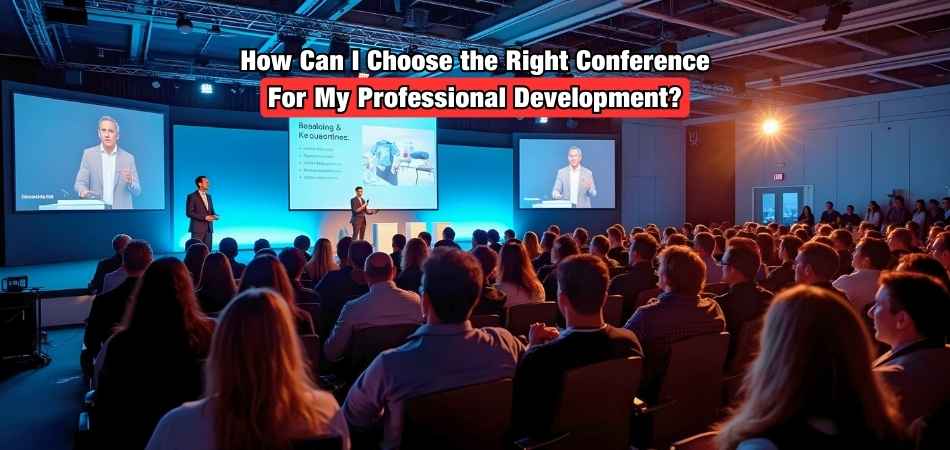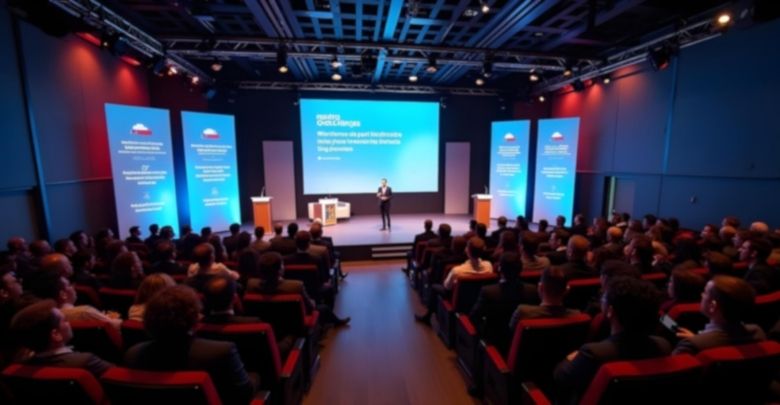Participants from various fields get together at conferences to exchange knowledge, discuss ideas, and present research. It’s a platform for professional discussion and often includes workshops, keynotes, and panels that cover a range of topics. Now, you might be wondering: How can I choose the right conference for my professional development?
Choosing the right conference involves aligning the event’s focus with your professional goals. It is crucial to consider the event’s relevance to your field, the expertise of the speakers, the networking opportunities it provides, and how the overall content can enhance your career growth. These elements ensure that the conference you attend delivers the maximum benefit.
Are you curious about making the most out of your next professional gathering? If you’re looking for detailed guidance, this article has everything you need to know. Learn how to choose and benefit from the right conference for your professional needs by reading our extensive discussion.
Why Should I Attend a Conference?
Participating in a conference offers great opportunities for networking and learning new skills. You can meet professionals in your field, exchange ideas, and even discover potential business partners. These connections can be valuable in both your personal and professional growth over time.
By attending a conference, you stay updated on the latest industry trends and innovations. The sessions often feature expert speakers who share knowledge and insights. This exposure can help you stay competitive and advance your career in your chosen field.
If you want a broader perspective, consider attending a conference in Canada, as these events bring together global experts and local professionals. The diverse viewpoints can provide diverse learning experiences and encourage new ideas, which can be beneficial for your career and personal development.
How Can I Choose the Right Conference for My Professional Development?
Taking part in conferences is a great way to grow professionally. It allows you to stay updated on industry trends, meet peers and experts, and gain new insights. Knowing how to choose the right conference will help you maximize the value of your experience. Below are the steps to choose the right conference:
Define Your Professional Goals
Defining what you want to accomplish during a conference is a good place to start. Whether you want to learn new skills, network, or discover innovative practices, having clear goals will guide you in choosing the right event. Aligning your goals with conference content ensures you gain the most value from the experience.
Research Relevant Conferences
After setting your goals, research conferences that are relevant to your specific interests and professional needs. Look for events offering sessions, speakers, and workshops related to your field. Professional associations and conference directories are great resources for finding conferences that match your objectives and provide the best learning opportunities.
Analyze the Conference Schedule and Format
Check the event’s schedule to ensure it fits your professional and personal commitments. Some conferences offer flexible formats, including virtual or hybrid options, which can save time and travel costs. Also, review the agenda to confirm it features sessions and speakers that align with your professional development goals.
Look For Networking Opportunities
One of the main advantages of attending conferences is networking. Think about the ways the event promotes interactions between attendees, like social gatherings or group workshops. Connecting with peers, mentors, and experts can lead to new business opportunities, collaborations, or friendships that positively impact your career growth and professional network.
Consider the Cost and Location
Make sure to analyze the total cost of attending, including travel, registration fees, and accommodation. Weigh the costs against the benefits, and ensure the location is convenient. If the conference is far from home, consider whether the expense and travel time are worth the potential professional gains.
Seek Recommendations and Reviews
Before committing, it’s helpful to hear from others who have attended similar conferences. Ask colleagues, mentors, or industry peers about their experiences. Additionally, reading reviews online can offer insight into the event’s overall quality, including the value of speakers, workshops, and networking opportunities.
Align with Your Learning Style
Think about how you best learn when choosing a conference. Some people prefer interactive workshops, while others are successful in lecture-style environments. Choosing a conference that matches your learning style can help you absorb information more effectively and ensure a more rewarding experience overall.
Plan for Post-Conference Engagement
Attending a conference is just one part of the process. Be sure to follow up with people you meet and apply new knowledge to your work. Staying engaged after the event can help you make the most of your experience and keep the momentum going.
Carefully consider these factors to choose the best conference for your career development. Proper planning ensures you gain valuable insights, build meaningful connections, and continue growing professionally. The right event can have a lasting impact on your success.
What Should I Look for When Choosing a Conference?
Choosing the right conference requires careful consideration to ensure that you gain the most value. Different events offer varying benefits, from learning opportunities to networking. By assessing various factors, you can select the one that best suits your needs and goals. Here are some things to look for when choosing a conference:
Location and Accessibility
When selecting a conference, consider the location and how easily you can attend. For example, if you’re attending an event in Canada, look for the best conference venues in Canada, as these often provide convenience and modern features. Choosing a venue that is easy to reach ensures a stress-free and productive experience.
Event Focus and Relevance
Make sure that the event covers topics directly related to your professional objectives and interests. Review the conference agenda and session details carefully to confirm alignment with your goals. Relevant events provide actionable insights and practical knowledge, making the experience more worthwhile for your professional growth.
Speakers and Experts
The quality of speakers and experts presenting at the event is a crucial factor. Seek conferences that feature recognized leaders or innovators in your field. Their talks and sessions can offer deep insights, fresh perspectives, and industry-specific updates that help you stay ahead professionally.
Networking and Collaboration
Opportunities for meaningful interactions with peers and experts are an essential part of conferences. Check if the event includes networking sessions, roundtables, or collaborative workshops. Engaging in these activities can lead to valuable connections, new ideas, and potential partnerships that support your long-term goals.
Cost and Value
Analyze the overall cost of attending, including travel, registration fees, and accommodation. Consider the value offered in terms of learning, networking, and career advancement. A conference that delivers a rich experience and tangible benefits can justify the expenses and make the investment worthwhile.
Carefully assessing these elements will help you select a conference that aligns with your goals and provides lasting value. Thoughtful planning ensures that your participation results in meaningful growth and impactful experiences.
How to Align My Career Goals With the Right Conference?
Making the most of your experience requires matching the appropriate conference with your career objectives. By focusing on your professional objectives, you can ensure the conference will help you grow. Choosing an event that meets your needs can accelerate your career development. Here are six steps to guide you in the right direction.
Step 1. Clarify Your Career Goals
First, take time to clearly define your career goals. These should reflect both your short-term and long-term aspirations. Knowing where you want to go professionally will help you identify conferences that align with your development needs. Be specific about the skills you want to acquire or enhance.
Step 2. Research Conference Themes
Next, research conferences based on the themes that resonate with your professional goals. Many conferences focus on specific industries or topics. You should explore events that cover subjects relevant to your career. Make sure the sessions and workshops match your interests and provide valuable insights.
Step 3. Identify Key Speakers and Experts
Look at the speakers who are leading the conference. Conferences with prominent leaders or experts provide a great opportunity to learn. These professionals can offer guidance and industry knowledge that directly applies to your goals. Having access to their insights can significantly benefit your career growth.
Step 4. Analyze Collaboration Opportunities
Think about the conference’s opportunities for collaboration. Connecting with like-minded professionals can help you expand your network and exchange ideas. Building relationships with others in your industry can open doors for collaborations, partnerships, or job opportunities that align with your career goals.
Step 5. Analyze Conference Format and Accessibility
Identify the conference format and location for convenience and accessibility. A conference should fit well with your schedule and preferences. Whether it’s virtual, hybrid, or in-person, choose one that offers flexibility. Ensure the event is easy to attend and does not conflict with your other professional commitments.
Step 6. Set Post-Conference Goals
After attending a conference, set clear goals for how to apply what you’ve learned. Whether it’s implementing new strategies at work or following up with new contacts, having a plan is essential. These post-conference actions help you turn the insights gained into tangible career growth.
Following these steps ensures that the conference you choose contributes directly to your professional development and aligns with your long-term career aspirations. By setting clear goals, you can make the most of every conference experience.
Tips to Maximize Learning at a Conference for Career Advancement
Making the most of your conference education is essential to developing your career. By actively participating and engaging with the content, you can gain valuable insights. To make the most of the event, you should focus on both the sessions and networking opportunities, including:
Be Active During Sessions
Engage actively during conference sessions by taking detailed notes, asking questions, and participating in discussions. Actively listening and interacting with the speakers will deepen your knowledge of the topics covered. Being present and involved ensures you absorb more information and make the most out of every session.
Network with Experts and Peers
Take full advantage of networking opportunities by connecting with industry leaders, speakers, and fellow attendees. Networking with others allows you to exchange ideas, ask for advice, and even explore potential collaborations. Building these connections can provide valuable insights and career opportunities after the conference.
Plan Ahead for Key Sessions
Don’t wait until the conference begins to decide which sessions to attend. Review the agenda ahead of time and identify key sessions that align with your goals. Planning ensures you attend the most relevant talks and workshops, maximizing your learning and helping you focus on topics that benefit your career.
Stay Organized and Focused
It is essential to maintain organization throughout the conference to make the most of your learning opportunities. Use a schedule to track sessions and allow time for networking. Staying focused will help you retain information better and avoid missing important discussions. An organized approach ensures you get the most value from the event.
Analyze and Reflect Post-Conference
Consider what you learned and how it relates to your career for a while after the conference. Analyze the key takeaways and plan how you can implement them. Additionally, you should check the quality of conferences before committing to future events to ensure ongoing professional development.
Following these strategies helps you gain meaningful insights and apply new knowledge effectively. By staying focused, organized, and engaged, you can make the most of any conference, leading to tangible career advancement.
FAQs About Choosing a Conference for Professional Development
With so many options, selecting the best conference for professional development can be difficult. To make the process simpler, we’ve answered some frequently asked questions about selecting the perfect event. These insights will help you make informed decisions and gain the most from your experience.
What Should I Do Before Registering for a Conference?
Before registering, research the conference thoroughly to ensure it aligns with your professional goals. Check the event’s reputation, past reviews, and the quality of sessions. Verifying these details will help you avoid wasting time and ensure the conference meets your expectations and adds value to your career.
How Can I Make the Most of a One-Day Conference?
To maximize a one-day event, plan your schedule carefully and focus on high-value sessions. Prioritize networking opportunities and have specific questions prepared for speakers or attendees. A clear plan ensures you cover essential areas while maintaining focus and achieving meaningful outcomes during the limited timeframe.
Are Smaller Conferences Worth Attending for Career Growth?
Conferences that are smaller and more specific can be very helpful. They often provide greater opportunities to connect directly with speakers and attendees. These events encourage meaningful interactions and in-depth discussions, making them a valuable choice for personalized learning and networking experiences that contribute to career advancement.
What Role Does Industry Reputation Play in Choosing a Conference?
When choosing a conference, industry reputation is a crucial consideration. Events with a strong reputation attract reputable speakers and high-quality sessions. They also tend to offer better networking opportunities, as professionals are more likely to attend. Attending such conferences enhances your credibility and ensures you gain reliable insights.
Should I Consider Conferences Outside My Industry?
Examining conferences held by people outside your sector can yield novel insights. Attending such events helps you learn about trends and practices that could benefit your work. These insights encourage creative thinking and cross-disciplinary approaches, making them valuable for professionals seeking unique strategies for growth.
How Important Is Timing When Choosing a Conference?
Timing is crucial as it impacts your ability to focus and participate fully. Ensure the conference does not conflict with your professional or personal commitments. Proper timing allows you to plan ahead, attend all sessions, and apply the insights gained without added stress or distractions.
Closing Remarks
Because they provide exceptional chances to learn, connect, and advance one’s career, conferences are essential to professional development. Selecting the right one requires thoughtful consideration of various factors to ensure it aligns with your career objectives. This process helps maximize the benefits you gain from attending.
To answer, how can I choose the right conference for my professional development? Focus on aligning the event’s focus with your career goals, assessing speaker expertise, and assessing networking opportunities. Research the agenda and consider factors like cost, location, and format to ensure the conference meets your needs and expectations effectively.
As you plan your next conference experience, remember to set clear goals, stay organized, and actively participate during sessions. These tips will help you make the most of the event and achieve meaningful growth. Best wishes on your professional development!








